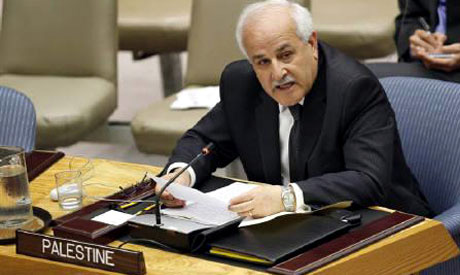
Permanent Palestinian observer to the United Nations Riyad Mansour, New York, 31 May, 2010 (Photo: Reuters)
The United Nations (UN) Committee on the Exercise of Inalienable Rights of the Palestinian People held a conference in Cairo under the title, "Seminar on Assistance to the Palestinian People," 6-7 February 2012. Attended by a number of permanent ambassadors to the UN, foreign ambassadors serving in Egypt, in addition to research specialists, presentations revolved around revealing the economic cost of the continued Israeli occupation of the Palestinian territories and proposing ways to mitigate it.
While the first task of the conference was sufficiently covered, the second — ways to mitigate it — was not covered as extensively. However, if the goal of the conference was merely raising awareness and attempting to provide updated quantifiable data on the cost of the Israeli occupation, it proved a success.
Some of the main points addressed had to do with the impact of Israeli practices and policies regarding displacement, demolitions of homes in East Jerusalem and Area C — which covers 60 per cent of the West Bank and is fully under Israeli control — as well as the impact of settler violence and the blockade of Gaza.
Permanent Observer of Palestine to the UN Riyadh Mansour pointed out that aid from the donor community would not be needed in the first place if the occupation ended. Mansour also stated that $ 7 billion is the annual cost of the occupation, and “Numbers show we (the Palestinian Authority) would be able to generate $7 billion without anyone’s help.” He added that if the occupation cost this amount, then it would be entitled to Palestinians once the occupation ends, thus enabling their self-governance. “The mathematics is simple: end the occupation!” he stressed.
“We are exposing you to another dimension of how ready we are for independence and statehood,” Mansour iterated as he referred to the bid for statehood undertaken by Palestinian Authority Chairman Mahmoud Abbas over the past year. While enhancing the collective will to end the occupation, the hope is to also to end the reliance of Palestinians on economic assistance.
Mahmoud Elkhafif, coordinator of the UN Conference on Trade and Development, talked about picking the correct term to use when characterising the situation, which he sees as “de-development.” This entails the transfer of Palestinian resources to Israel, depriving Palestinians of the ability to feed themselves, and deepening dependence on the Israeli economy and on donors.
Alex Pollock from the UN Relief and Works Agency for Palestine Refugees (UNRWA) stated that for 20 years Israel made sure that the economy of the Palestinians remain suppressed. He said that 35 per cent of the PA’s budget in 2011 came from domestic revenues while the rest was under the control of Israel.
“Development will not materialise unless land and resources are sustained,” added Geoffrey Prewitt from the UN Development Programme. Israel is able to reap the benefits and resources of Palestinian land, whether by encroaching settlement activity or the encroachment of the separation barrier, in addition to blockading the Gaza Strip. Most poignant is the deliberate uprooting of approximately 10,000 olive trees in 2011, each worth $1,000 approximately, a total of $1 million in losses.
The sense of frustration felt with the lack of effective accountability by Israel was expressed in the questions and answers session. An audience member, Amal Elagha from the General Union of Palestinian Women in Cairo, commented on the need of Palestinians for tangible measures to alleviate the economic pains of the occupation, along with its broader negative impact on Palestinian lives.
In response, Maxwell Gaylard, UN Deputy Special Coordinator for the Middle East Peace Process, said that international law was only as strong as the member states of the UN want it to be. It comes down to the UN General Assembly and the Security Council to uphold it. He further added that only certain things could be done by civil servants, and they certainly could not force governments to do what they are not doing. What is within the scope of civil servants is the ability to watch, monitor, report and condemn, Gaylard concluded.
Short link: